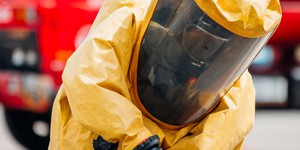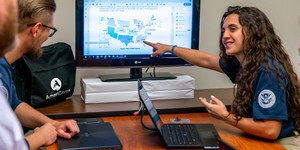Physical Science Careers (36 results)
|
Select a resource
Filter by
Sort by
|
Career Profile
How is climate change affecting Earth? What will the changes mean for society? If these are questions that peak your curiosity, then you might be interested in a job as a climate change analyst. Climate change analysts evaluate climate data and research to determine how shifts in the climate will affect natural resources, animals, and civilizations. They use this information to make suggestions about what individuals and governments can do to ensure a higher-quality life for everyone in the…
Read more
Career Profile
Nuclear technology is used to image the human body, destroy cancer cells, sterilize food and medical equipment, create pest or drought-resistant seeds, and to generate power for 1 in 5 U.S. homes and businesses. Nuclear monitoring technicians help to keep the people who work with nuclear technology and the environment safe from excessive radiation exposure. They use special instruments to measure and monitor the radiation levels of workers, work areas and equipment, and they are involved in…
Read more
Career Profile
There will always be both man-made and natural disasters, like hurricanes, earthquakes, and terrorist attacks, that affect public health and safety. Emergency management specialists are the officials that plan for these disasters—imagining and preparing for the worst—and then coordinating the emergency responses. Emergency management specialists work for local, state, and federal governments, as well as for law enforcement, the military and private agencies to ensure that people…
Read more
Career Profile
Good taste, texture, quality, and safety are all very important in the food industry. Food science technicians test and catalog the physical and chemical properties of food to help ensure these aspects.
Read more
Career Profile
One in five United States homes and businesses is powered by nuclear power, and nuclear power reactor operators are the people who ensure that those reactors are operating safely and efficiently at all times. They monitor all equipment continuously, and implement procedures if malfunctions are observed. They also control and adjust the amount of power being generated, and the reactor coolant temperature as power demands change through the day and during weather events, like heat waves.
Read more
Career Profile
Any time you hear music at a concert, a live speech, the police sirens in a TV show, or the six o'clock news you're hearing the work of a sound engineering technician. Sound engineering technicians operate machines and equipment to record, synchronize, mix, or reproduce music, voices, or sound effects in recording studios, sporting arenas, theater productions, or movie and video productions.
Read more
Career Profile
Maps can give us much more information than ways to get from A to B. Maps can give us topographic, climate, and even political information. Cartographers and photogrammetrists collect a vast amount of data, such as aerial data and survey data to produce accurate maps and models. For example, by collecting rainfall data, a cartographer can make an accurate model of how rainfall can affect an area's watershed. The maps and models can then be used by policy makers to make informed decisions.
Read more
Career Profile
When you hear the word geography, you might think of maps and names of state capitals, but the work of geographers is much more than creating maps and identifying places. Geographers look at how people, places, and Earth are connected. They study the economy, social conditions, climate, and topography of a region to help answer questions in urban and regional planning, business, agriculture, and medicine.
Read more
Career Profile
Many people work in environments that have obvious potential dangers, like collapses in mines, chemicals in laboratories, or machinery in factories, but there can be hazards in almost any job, like repetitive stress injuries from constant computer use or from scanning groceries. Occupational health and safety specialists identify potential hazards in a job, and then figure out ways to reduce the risks of accidents or injuries to workers or to the public. They also investigate accidents when…
Read more
Career Profile
One of the basic truths in the universe is that objects tend to go from a state of higher organization to a state of lower organization over time. In other words, things break down, and when those things are precision instruments or equipment, they require the services of very specialized technicians to restore them to their working order. Precision instrument or equipment technicians often combine a love of music, medicine, electronics, or antiques with delicate mechanical repair work.
Read more
|














